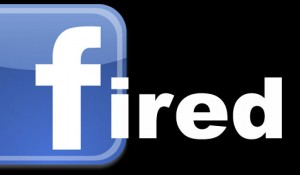
A tech company, SendGrid, recently fired a female employee, Adria Richards, who used Twitter to complain about sexual jokes made by male employees from a different company.
During a conference in San Francisco, Richards tweeted that it was “Not cool” that the men were making inappropriate sexual jokes. She used her phone to take a picture of the men sitting behind her and then used Twitter to post the picture.
One of the men in the photo was terminated by his employer, San-Francisco based PlayHaven.
But Richards also found herself in the middle of a social media storm and was ultimately fired by her employer. SendGrid CEO Jim Franklin blogged that Richards was not fired because she reported offensive conduct, but because of
how she reported it – using Twitter to post photographs and “publicly shaming” the offenders.
Franklin also went on to say that Richard’s actions caused division amongst the developer community that Richards serves as part of her job and that she can no longer be effective.
But this is what often happens when an employee complains of inappropriate conduct: A complaint is made, which may create division at work and with customers; people may take sides. Regardless of such division and the ultimate outcome of any investigation, the employee is supposed to be protected from retaliation for complaining of harassment or discrimination.
This situation poses difficult questions: Can an employee complain in any manner he/she sees fit? Airing information across social media platforms and posting pictures of co-workers, customers or collaborators?
The law provides strong protections for those who complain about harassment or discrimination. As demonstrated by recent decisions by the National Labor Relations Board, the law also protects employees who engage in concerted activity with other employees to improve their working conditions — which may include employees complaining to each other over social media.
The San Jose Mercury News
explored the legal ramifications of the situation. Discussing the incident, Rob Pattinson, a Jackson Lewis attorney who represents employers, remarked, “It’s a tough one … The law is strong in protecting people who make complaints of harassment, or who participate in an investigation about complaints of harassment.”
Read More
Tags:
Retaliation,
sexual harassment,
protected activity,
employees,
HR Allen Consulting Services,
Employers,
HR Informant,
NLRB,
social media
Gov. Edmund G. Brown signed a bill today, prohibiting employers from requiring or requesting employees or job applicants to provide user names or passwords for personal social media accounts so employers can gain access to the accounts.
Read More
Tags:
HR Allen Consulting Services,
HR Informant,
Privacy,
social media

A San Diego Gas & Electric (SDG&E) company employee filed a lawsuit against SDG&E after she was fired because of her Facebook post about a customer. Did SDG&E do anything wrong?
The issue of whether an employer can discipline an employee for his/her Facebook posts has received plenty of attention in the national press. HR Informant previously reported on the National Labor Relations Board’s activity in this area.
If an employee discusses working conditions on his/her Facebook page, that activity may be protected under Section 7 of the National Labor Relations Act (NLRA). Under Section 7, employees in both union and nonunion workplaces have the right to engage in concerted activities, including discussing working conditions, pay or other work-related issues.
In 2011, the NLRB acted against several employers when those employers disciplined employees for work-related comments on Facebook.
In San Diego, the SDG&E employee said she was fired after allegedly posting a comment on a co-worker’s Facebook page about a customer and using the customer’s first and last name. According to the employee, SDG&E told her she was fired because her Facebook post violated the company’s customer privacy policy.
The SDG&E employee filed a lawsuit claiming that the alleged violation of the company’s customer privacy policy is not the real reason for the termination. The lawsuit alleges that the firing has a discriminatory motive.
Though employees may not be fired for an unlawful reason, such as engaging in protected activities, employers still have the right to set and enforce policies protecting the privacy rights of their employees and their customers. It is a balancing act with competing interests: the company’s right to protect proprietary information and obligation to protect customer privacy, and employees’ rights to discuss working conditions.
With the ever-changing landscape, employers should carefully craft their social media policies. Employers may also want to consult with counsel before terminating an employee for conduct involving social media.
Read More
Tags:
employee fired for facebook post,
social media in the workplace,
HR Allen Consulting Services,
HR Informant,
employee,
social media,
facebook
The landscape of employment laws evolves quickly, and entrepreneurs and small business owners are often left scrambling to understand new rules and implement new procedures. To reduce the stress, read these legal updates on seven employment law “hot buttons” that should be on the radar screen of every small business:
Read More
Tags:
Immigration,
contractor,
employment law,
entrepreneur,
Business,
Small business,
employment law labor,
right-to-work,
exempt,
arbitration,
workplace safety,
Employment,
social media
In 2011, the National Labor Relations Board (NLRB) increased its oversight activity relating to employer disciplinary actions for social media postings made by employees. HR Watchdog blogged frequently in 2011 on the NLRB’s activity in this area.
Yesterday, the NLRB’s General Counsel issued its second report describing 14 social media cases reviewed by its office. The NLRB’s first report on 14 other social media cases was released in August, 2011.
The purpose of this second report, as stated by the NLRB, is to provide further guidance to labor and employment law practitioners and HR professionals — many of whom grapple with how to handle employees who use social media to air workplace complaints or simply bad-mouth the company.
Seven of these 14 cases involve questions about an employer’s social media policies. Five of the social media policies were found to be overly broad and unlawful.
The problem occurs when a social media is written so broadly that it prohibits employees from discussing wages or working conditions. Employees, in both union and nonunion workplaces, have the right under Section 7 of the National Labor Relations Act (NLRA) to engage in concerted activities, including discussing working conditions, pay or other work-related issues.
If those discussions occur using social media accounts (such as an employee’s Facebook or Twitter account), the discussions may be protected under the NLRA.
The NLRB also stated that it intends to develop a practice of tracking all social media cases and developing a consistent approach. The Acting General counsel asked all regional offices to send cases which they believe to be meritorious to the NLRB’s Division of Advice in Washington, D.C.
The NLRB noted that its report represents its “interpretation” of the NLRA as it applies to social media communications and that some of these decisions are currently pending before the Board. The Board’s eventual determinations in those pending cases will provide further guidance as the law develops.
Read More
Tags:
employees,
Employers,
NLRB,
social media,
CalChamber,
facebook,
twitter,
NLRA,
section 7 of the NLRA,
working conditions




















